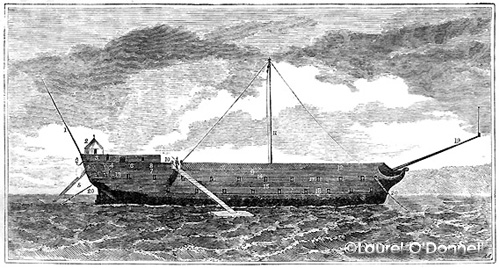|
|
Chapter III
Important Incidents of the Revolution
and Later History of Manhattan. New York Government at Sea—Plot to Assassinate Washington—Shocking Barbarity of English Officers—Hale and André, the Two Spies—Arnold in New York—British Evacuation—The Burr and Hamilty Tragedy of 1804—Robert Fulton and the “Clermont“—Public Improvements of 1825.
Shocking Barbarity of English Officers, continued
The spirit of Yankee adventure was not wanting, however, even in those floating dens of pestilence and famine. The prisoners on board the "Jersey" secretly obtained a crow-bar, which they artfully concealed and used on windy and stormy nights to break off the port gratings, when good swimmers would plunge into the water and make their way to the shore. Thus numbers escaped to their friends, to tell the sad story of their sufferings and reveal the still sadder fact of the numbers who had died. A singularly daring and successful feat was undertaken in December, 1780, by some adventurous New England captains suffering on the "Jersey." The best boat of the ship had returned from New York about four in the afternoon, and was carelessly fastened at the gangway, with her oars on board. A storm prevailed, and the wind blew down the river, producing an immense tide. At a given signal a party of prisoners placed themselves carelessly between the ship's waist and the sentinel, while the four captains entered the boat, the fastening of which was thrown off by their friends. The boat passed close under the bow of the ship, and was at a considerable distance from her before the sentinel at the forecastle gave the alarm and fired at her. The second boat was manned with much dispatch for a chase, but she pursued in vain. One man from her bow fired several shots at the deserters, and a few guns were discharged from the shore; but all to no effect. The boat passed Hell-gate in the evening, and arrived at Connecticut with her precious freight the next morning. Very few deserters were captured. Civilians also suffered with the soldiers. On one of the coldest nights of the century a party of British troops crossed the Hudson river on the ice and proceeded to Newark. After capturing the little garrison they burned the academy and rifled many of the dwellings. They then entered the house of, Justice Hedden, and carried him from his bed a prisoner, with no clothing to screen him from the dreadful blast say his shirt and stockings, wounding his wife in her head and breast, who remonstrated against this inhuman procedure: Fortunately, a few militia pursued them and rescued the Justice, who was dreadfully frozen, and must have perished long before reaching New York. When the traitor Arnold entered New York, he speedily procured the arrest of more than fifty of the warmest friends of independence, who were hurled into dungeons and other places of confinement, where they long continued. The poor prisoners were kept in profound ignorance of the progress of the war, and were led to believe that their cause was hopelessly lost. Imagine the feelings of one of these sufferers, in the old sugar-house in Liberty street, as he one day stood leaning in bitterness of soul against the high fence which surrounded it, when a citizen, passing near by, without halting or turning his head, said, in a low tone, "General Burgoyne is taken, with his whole army. It is the truth; you may depend upon it." His sinking hopes revived. He hobbled back into the gloomy den, to whisper in palsied ears the cheering truth, and raise, even in those death-glazed eyes, the thrice welcome vision of a country saved. That friendly informant would have suffered severely if discovered; but his contribution to these wasting patriots was more valuable than the gold of Ophir or the affection of woman. But the plant of liberty does not die of hunger, or thirst, or nakedness, or reproach, or contumely. Nay, these but accelerate its immortal development; and, amid the sufferings of the prisons, the privations of the camps, the wails and sobbings of widows and orphans, it continued its sublime expansion, until, at length, bursting through every opposition, it spread its benign shadow o'er all the land. In the midst of these appalling sufferings, the British officers of New York amused themselves by planning a theatre, consenting themselves to become the comedians—a practice which they continued, in the edifice in John street, for several years, the tory population attending and applauding their entertainments.  The Jersey Prison Ship—As moored in Wallabout Bay, Brooklyn, in 1780
One of the most prominent of the decaying ships of the British, In which the captured Americans were imprisoned and inhumanly treated. |
|
36
:: Previous Page :: Next Page ::
Books & articles appearing here are modified adaptations
from a private collection of vintage books & magazines. Reproduction of these pages is prohibited without written permission. © Laurel O’Donnell, 1996-2006.
|
|

